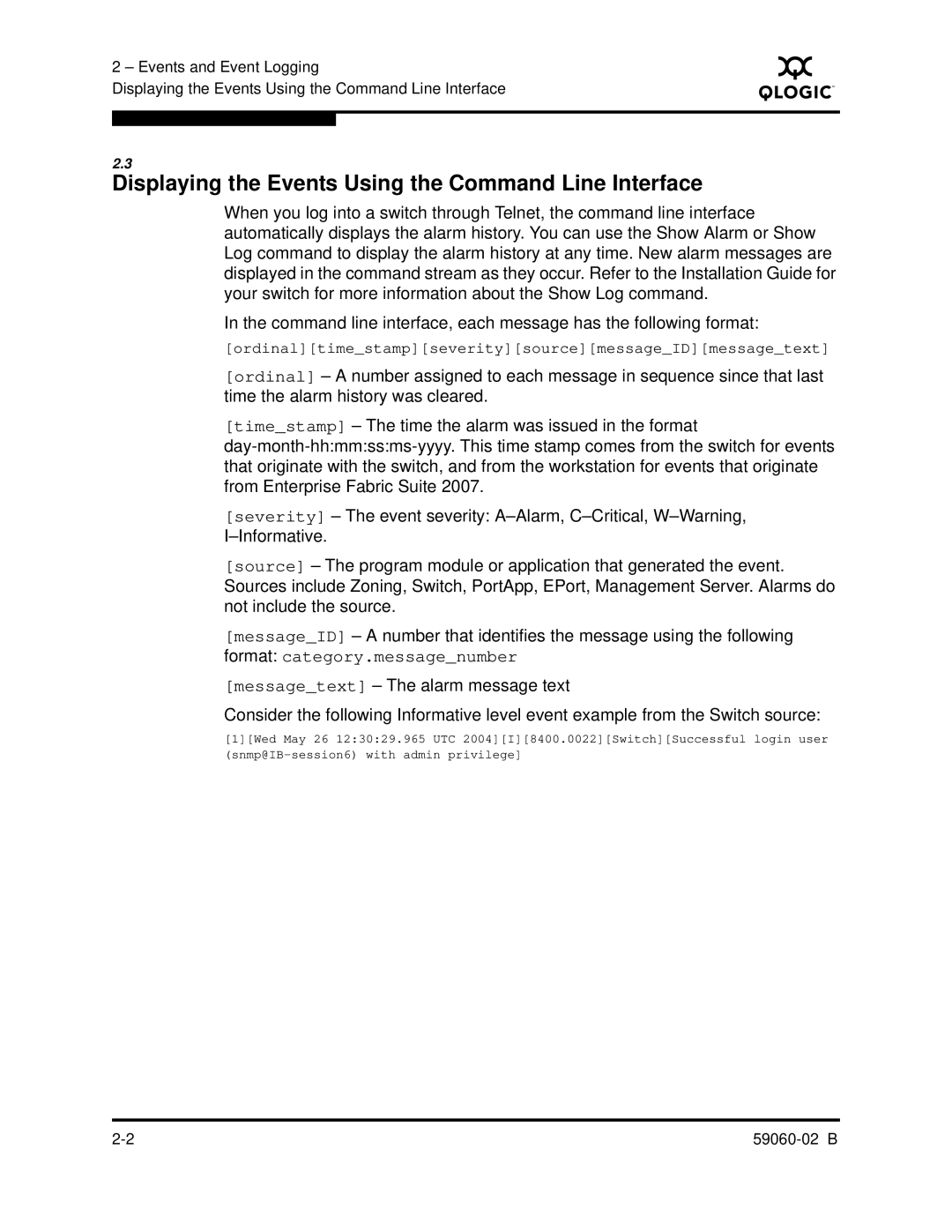QLogic Fibre Channel Switch Event Message Guide
Document Revision History
Table of Contents
QLogic Fibre Channel Switch Event Message Guide 59060-02 B
Intended Audience
Related Materials
Availability
Technical Support
Training
Contact Information
Support Headquarters
Introduction Technical Support 59060-02 B
Displaying Events using the Event Browser
Understanding Severity Levels
Displaying the Events Using the Command Line Interface
Configuring the Event Log
Archiving and Downloading the Event Log
Configuring Port Alarm Thresholds
Alarm Events
A1000.001E Hotreset failed and the switch is being reset
A1003.0010 Segmenting, zoneset zonesetname not defined
A1003.000D Fabric already locked by domain domainID
A1003.000E Couldnt acquire lock from domain domainID
A1003.0011 Segmenting, zoneset zonesetname already active
A1003.0014 Segmenting, alias aliasname merge conflict
A1003.0013 Segmenting, zone zonename merge conflict
A1003.0016 Releasing Lock held too long by domainID
A1003.0023 Fabric Busy Zoneset operation failed
A1003.0024 Request already in progress internal lock held
A1003.0025 Error reading security set
A1003.0033 No memory for command completion
A1003.0030 Zone Merge rejected by remote switch
A1003.0031 Error reading zoneset from activate direct
A1003.002E Zoning merge has been rejected
A1003.0039 Merge failed, total zone limit would be exceeded
A1003.003C Incompatible Zoning mode, Isolating link
A1003.0040 Zone Member type membertype unsupported
A1003.0050 ISL group does not contain entry for this switch
A1003.004F No Zone Merge Response
A1003.0054 Failure at remote switch
A1004.0008 Eport Isolating due to ELP Incompatibility
A1003.0064 UFC failure received from domain domainID
A1004.0009 Eport Isolating due to ESC Incompatibility
A1004.000E Eport Isolating due to RDI Domain out of Range
A1004.000A Eport Isolating due to EFP Domain Overlap
A1004.000D Eport Isolating due to RDI SW Reject
A1004.000F Eport Isolating due to Merge Zone Failure
A1004.0012 Eport Isolating due to ISL Security
A1004.0011 Eport Isolating due to Remote switch isolated
A1004.0015 Eport Isolating due to Invalid Attach
Are not the same on both switches
Fabric
A1004.0040
A1004.0048 Eport Isolating due to Port Binding failure
A1004.0052 Eport Isolating due to Switch Binding failure
A1004.0049 Eport Isolating due to Remote inactive
A1005.0013 Hotswap procedure failed must hardreset switch
A1005.0020
A1005.0035 System resource error contact technical support
A1005.0034 System resource error contact technical support
A1005.0039 Fabric Login Flogi from address FCaddress failed
A1005.003B Warning Debug logging filter level is set
A1005.0040 Unsupported SFP within port
A1007.0001 NS Unspecified zoning enforcement error
A1006.0005 Zoning enforcement error in Nameserver
A1007.0002 Security WWN deviceWWN not authorized to join
A1007.000B Security Efmd Rejected, bad revision
A1007.0011 Chap failure, isolating with Invalid Attach
A1007.001C Security Bad Authentication Flags
A1007.0025 Security feature not supported
Meaning Radius authentication failed Action
Event Messages Alarm Events
A1007.0033 Device deviceWWN failed port binding
A1007.0034 Device devicewwn failed switch binding
A1007.0038 Device devicewwn failed switch binding
A1007.0037 Device devicewwn failed port binding
A2001.0001 Pwr2 was installed Alarm Cleared
A2000.0001 Pwr1 removed Alarm SET
A2000.0002 Pwr2 failure Alarm SET
A2001.0002 Pwr1 OK Alarm Cleared
SET
A3014.0003 Blade bladeID set Down due to blade type mismatch
A6001.0002 cmon blade failed Ndcla
A6001.0003 cmon switch failed Ndcla
A6001.0001 cmon insufficient memory
A6001.0004 cmon Blade was removed during Ndcla
Critical Events
Switch The switch is proceeding with a hotreset
8300.000C Zoning Couldnt acquire lock from domain domainID
Switch The switch will hardreset in several seconds
Switch The switch is now performing a hotreset
Switch The switch will be reset in several seconds
8400.000E Switch Upgrading Licensed Ports to numberofports
Switch Invalid user accountname attempted to log into switch
Switch Upgrading License for multiple ISL capability
Switch Upgrading License for 4G capability
Switch New licenses are being installed
Switch The switch WWN is being upgraded
8400.004E Switch ntpdate synchronization lost
Switch Upgrading License for Efcm capability
Switch radius All Radius servers failed to respond
8400.005D Switch Upgrading License for SANdoctor
Switch New firmware has been installed
8400.006A Switch Upgrading License for Fabric Security
Downed to due to unavailable licenses will be restarted
8F00.000C Fabric Status status
Connection failure, fabric limited to two switches
8F00.000D Switch Status status
8F00000E Link Status status
User SFC received with unknown operation operationcode
Switch Attempted unauthenticated login username accountname
User Releasing Lock held too long by domainID
User Unlock failed, resource unavailable, will retry
Switch that are no longer in use
Informative Events
Zoning New Active ZoneSet zonesetname
Mserver Rejecting request commandcommand
Zoning Processing zoning requests, Checkpoint not permitted
Zoning Reading zoning database, Checkpoint not permitted
Zoning Removing all inactive zoning objects
Switch Hotreset not permitted at this time, try again later
EPort In Fabric Reconfiguration
Switch a CIM edit session has been canceled
PortApp Port portnumber Cancelling Online Test
EPort Port portnumber Inter-Switch Link ISL Offline
8F00.000B Login Changed
8F00.0007 Switch Added
8F00.0008 Switch Removed
8F00.0009 Link Added
Event Messages Informative Events 59060-02 B

